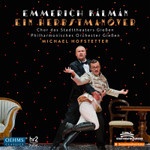|
Back
05/21/2019
Emmerich Kálmán: Ein Herbstmanöver (The Gay Hussars)
Harald Pfeiffer (Lohonnay), Marie Seidler (Treszka), Christiane Boesiger (Baroness Riza von Marbach), Grga Peros (Lörenthy), Tomi Wendt (Wallerstein), Clemens Kerschbaumer (Marosi), Rainer Hustedt (Kurt), Rainer Domke (Bence), The Giessen Philharmonic Orchestra, Robert Varady (violin), Jan Hoffmann (chorus master), Michael Hofstetter (conductor)
Recording: Theater Giessen, Giessen, Germany (January 2018) – 79’50
Oehms Classics OC 977 (Distributed by Naxos of America) – Booklet in German and English

   
The first operetta created by Emmerich Kálmán was originally scored under the moniker Tatárjárás in Budapest in 1908. Due to its Hongrois success, it went on to transform itself into a few other unique labels (including modification of lyrics and music), one being entitled Ein Herbstmanöver when it premiered in Vienna the following year. Based on the album’s photos, this 2018 Giessen production must have been quite phenomenal, but inside this audio-only collection, the written material befuddles rather than congeals.
In comparison to other works, such as the more familiar Die Csárdásfürstin or Die Zirkusprinzessin,
Ein Herbstmanöver shows a spicier Kálmán with some numbers whirling away in extra-hot paprika. Matthias Kaufmann’s introspective dramaturgy notes (“The Sorrowful Widow”) and Balázs Kovalik’s discussion about his new staging (“Crying while dancing and celebrating when you have problems”) contribute to the operetta’s overall tenor, yet they’re inconsequential without being supported by a tighter “Synopsis” write-up. The aforementioned, along with track details, leave much to the listener’s imagination. Track titles (i.e. when downloading on iTunes) are displayed in either Japanese or Chinese characters (???) [excepting track 16 entitled, “Himmel Hergott”] (who’s he?), with two musical numbers being slotted into the CD from Kálmán’s later (obscure) work, Der Gute Kamerad (1911)…nowhere does the album explain the significance. The “Brief Hussar Glossary”, an interesting tidbit, nonetheless, doesn’t dispense to the recording’s overall objectives.
After listening to several of the tracks and attempting to try and follow the plot, the exercise was futile. The best suggestion is to enjoy the listen based on the operetta’s melodious and animated dialogues.
It’s a pity Oehms Classics didn’t take more time in thinking through the details, for the singers and choral numbers are quite convincing with sound and volumetric quality being richly luxuriant.
Christie Grimstad
|